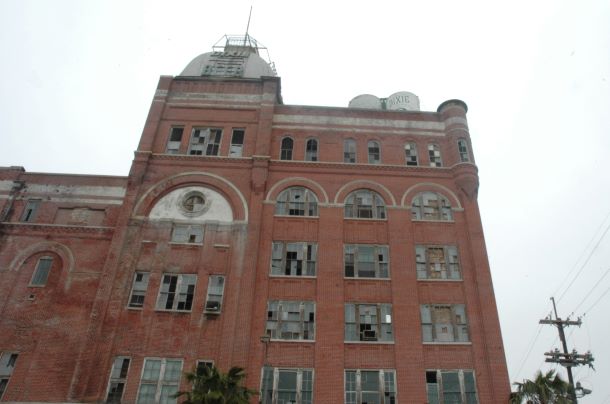 Abandoned Dixie brewery, five months after Hurricane Katrina struck New Orleans
Abandoned Dixie brewery, five months after Hurricane Katrina struck New Orleans
The New Orleans brewing company formerly known as Dixie announced this week that its new name is Faubourg Brewing.
The name comes from the French term for settled areas outside a city. As New Orleans grew in the 18th century expanding neighborhoods were called faubourgs and many still are, such as Faubourg Marigny and Faubourg St. John.
You’ll recall that in June, Dixie was one of several brands (think Dixie Chicks becoming The Chicks or Uncle Ben’s rice becoming Ben’s original) to retire its old name. The company asked consumers to submit possible new names (5,400 did) and conducted focus groups.
The name they chose seems as bold as the decision to change the name. Dixie Brewing has been around since 1907. It has a name that tourists look for and one that drinkers across the country seek out during Mardi Gras. Faubourg is a name that makes sense to locals. That’s as it should be.
“We’ve heard from so many people who appreciate the decision to change, but some who are frustrated by it, too,” brewery manager Jim Birch told nola.com. “What I tell them is that this is not a repudiation of what Dixie was or what you liked about it. When you take a step back and ask does the name represent what you’re doing, and if it’s offensive to a lot of people, why are you keeping it? It comes to a point where it’s not worth holding onto that.
“We were worried maybe it was a little too New Orleans. Would people understand it? But we got great feedback on it. It survived every step of the process.”
When New Orleans Saints/Pelicans owner Tom Benson and his wife, Gayle, bought Dixie in 2016 it was a ghost brand, last brewed in New Orleans in 2005. The business was struggling long before Hurricane Katrina ravaged the brewery itself, leaving it inoperable. Brewed under contract in Wisconsin, Dixie was local in name only.
The Bensons promised to build a new brewery, which opened late last year, about a year and a half after Tom Benson died.
Beer labeled Faubourg should be available early next year. Birch said that the company is tweaking the recipe for its flagship lager. “If you have Dixie today and a Faubourg tomorrow it will taste the same, but a little better,” he said.
And what did it taste like back in the day? I recently mentioned that it sometimes makes me smile to pull out old tasting notes, particularly from James Robertson or rock/book reviewer Robert Christgau.
Robertson lists 15 beers brewed at Dixie in “The Beer-Tasters Log.” Dixie Lager scored of 52 (for reference, Miller High Life earned a 64) and wrote, “Gold, with a touch of amber, lightly hopped slightly sour aroma, light body, refreshing hop flavor, medium dry finish and aftertaste.” He gave Dixie Blackened Voodoo (a schwarzbier briefly banned in Texas because of the voodoo reference) a 63 and Dixie White Moose a 67. “A chocolate freak’s dream, not really a beer but very nice.”
Christgau is a little more eloquent.
“After Pearl bought out Jax last summer, Dixie became the last of the New Orleans locals. Rumours that it caused diarrhea are supposed to have done Jax in. We went too late to test the rumour personally. A Mississippi friend tells us Jax tasted quite a lot like Dixie—somehow managing to taste dry and fruity at the same time, suggesting sweetness without actually being sweet. Dixie was one of the surprise favorites of our survey, winning several blindfold tests against a varied competition.
“Traditionally the White beer in New Orleans (Jax and Falstaff shared the Black market), Dixie emerged from the civil rights years with a nearly four-fold increase in sales, while Falstaff’s sales went down dramatically after a liberal ad campaign up North. But unbalance competition from the supernationals—the real cause of Jax’s demise—makes strange alliances. Now, with Tulane students driving to Texas for a Coors, the suburbs turning to Bud and the black market gone to Schlitz, Dixie is starting a youth-oriented ‘Big doesn’t always mean best’ campaign, while cautiously slipping a few soul ads into the black radio stations. Good luck. B PLUS”